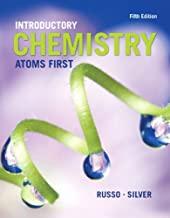One way to calculate the value of a reactions equilibrium constant is to perform the reaction, let
Question:
One way to calculate the value of a reaction’s equilibrium constant is to perform the reaction, let it come to equilibrium, measure the concentration of all the reactants and products, and then plug those concentrations into the equilibrium constant expression and calculate its value.
(a) A student performs the reaction A(aq) + 2B(aq) ⇄ C(aq) starting with 2.0 M A and 4.0 M B. He finds that at equilibrium, the concentrations of A, B, and C are 0.020 M, 0.040 M, and 1.98 M, respectively. What is the value of this reaction’s equilibrium constant (write your answer using scientific notation)?
(b) Next, the student repeats the experiment, but this time he starts with 3.0 M A and 5.0 M B. What value will he get for Keq when he measures the equilibrium concentrations and plugs them into the equilibrium constant expression?
Step by Step Answer:

Introductory Chemistry Atoms First
ISBN: 9780321927118
5th Edition
Authors: Steve Russo And Michael Silver





